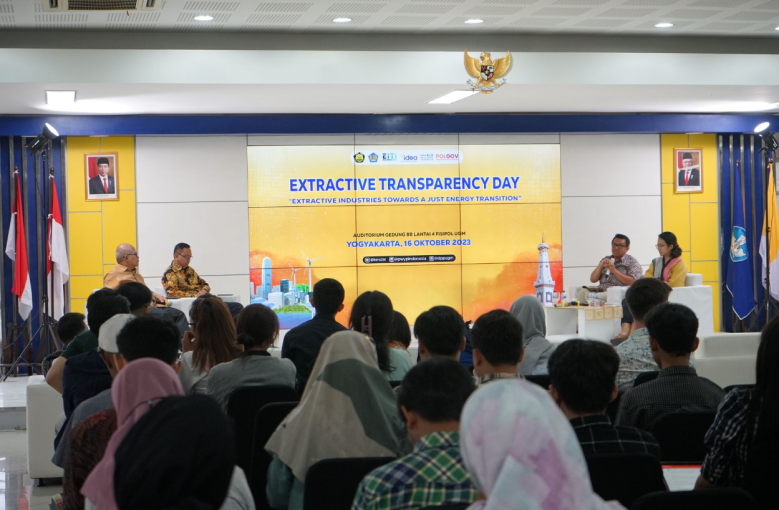
Yogyakarta, October 16th 2023─As part of a series of events launching the Extractive Data Portal managed by the Ministry of Energy and Mineral Resources (KESDM) as the Secretariat of the Indonesian Extractive Industries Transparency Initiative (EITI), the event “Extractive Transparency Day: Extractive Industries Towards Just Energy Transition” was held on Monday (16/10). The organization of this event was the result of collaboration between various parties, namely the Research Center for Politics and Government (PolGov) Faculty of Social and Political Sciences UGM; Ministry of Energy and Mineral Resources (KESDM); Publish What You Pay (PWYP); and Indonesian Ideas and Analytics (IDEA). The event was held offline at the Mandiri Auditorium Fisipol UGM.
It cannot be denied that currently, the extractive industry is still the main focus of the economies of various countries, including Indonesia. However, according to Wawan Mas’udi, Dean of Fisipol UGM, the extractive industry sector still has many challenges, obstacles and problems in its management. “The problem of extractive industries is not only the environmental impact, but also externalities in the form of massive environmental damage, policies to exploit natural resources which actually produce a curse rather than a benefit,” explained Wawan in his speech. It is this curse that must be minimized. Wawan said that this transparency initiative was an important part of encouraging efforts to minimize what Wawan called the resource curse, namely a phenomenon where a country is not prosperous even though it has abundant natural resources.
Binahidra Logiardi, Head of Mind Id’s CSR Division, also emphasized the importance of transparency. Extractive industry transparency cannot be seen as the result of coercion or pressure, but is about how sustainability principles can be encouraged to be internalized in mine management. “Transparency means we have to be better. “With transparency, the public can know what we want to achieve and what we are doing,” said Binahidra.
Regarding data management, there are several things that must be paid attention to. According to Amin Sunaryadi, Chair of the Tax Supervisory Commission, the concept of transparency means that data from many parties must be entered into a database system accompanied by access controls. “Often, people are not detailed. Parties who are relevant to the data are not given access, but parties who are not relevant are given access,” said Amin. He conveyed this based on his experience of meeting with the Association of Oil and Gas Producing Regions (ADPM) who do not have access to data regarding mining carried out in their own areas. According to him, accuracy is needed in managing incoming data, the relationship between existing data, and who can access the data.
Hasrul Hanif, Lecturer at the Department of Politics and Government at UGM, believes that the existence of EITI can build trust, open up space for dialogue, and be an important basis for information data. Hanif explained that one of the differences between the scheme created by EITI and other schemes is in the systematic disclosure aspect. He also emphasized the importance of encouraging the EITI scheme not only at the center, but also at the regions. “It is impossible for us to encourage procedural justice if the data is asymmetrical,” said Hanif.
The discussion session moderated by Indah Surya Wardhani, UGM PolGov researcher, was then continued with the Study Dissemination activity “Community Involvement in a Just Energy Transition through EITI Implementation” presented by Aryanto Nugroho, National Coordinator of PWYP Indonesia. This dissemination was also responded to by various parties; Djoko Widajatno, Executive Director of the Indonesia Mining Association; Sigit, Head of Environmental Planning and Studies, North Morowali Regency Environmental Service; Mohammad Arif, Towara Village Community Representative, Morowali Utama Regency; and Amalinda Savirani, UGM DPP Lecturer and moderated by the Executive Director of IDEA Yogyakarta.
Meanwhile, this event also supports SDGs 7, namely Clean and Affordable Energy.
